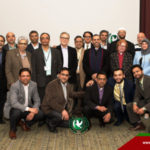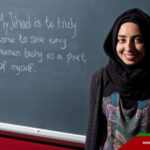By Fatima Kermali
In Islam, the importance of family is paramount as the Holy Quran states, “And be careful of (your duty to) God in whose name you demand (your rights) from one another, and (to) the ties of relationship; surely God is ever watchful over you!” (4:1)
The sixth Imam or leader after Prophet Muhammad (p), Imam Jafar As-Sadiq (as) was asked about this verse. He explained, “It means the family relationship. Surely, God, the highest has ordered it to be regarded and has magnified it. Do you not observe that He has mentioned it with Himself.”
In the same chapter once again reverence is given to parents and relatives as they are mentioned along with God. “And Worship God and join none with Him in worship, and do good to parents, kinsfolk.” (4:36)
Such a high rank is given to the family because it is the foundation of society. The family builds a community and then continues to further expand until we have a global village. Therefore, each individual in a family has rights and responsibilities. When these liberties and obligations are appropriately observed then harmony can ensue in the home. Neglecting the duties or not observing the rights of others surely causes instability in the family and turn disruption in society. Imam Sajjad, Ali ibn Hussein (as) has profoundly mentioned the rights of womb relatives in his Treatise of Rights. He wisely and succinctly mentions the rights of a mother, father, child, and brother which are so universal that it transcends time, nationality, faith, and culture. In regards to the mother, Imam Ali Zainul Abideen (as) expounds:
“The right of your mother is that you know that she carried you where no one carries anyone, she gave to you of the fruit of her heart that which no one gives to anyone, and she protected you with all her organs. She did not care if she went hungry as long as you ate if she was thirsty as long as you drank if she was naked as long as you were clothed if she was in the sun as long as you were in the shade. She gave up sleep for your sake, she protected you from heat and cold, all so that you might belong to her. You will not be able to show her gratitude, unless through God’s help and giving success.”
Not until Prophet Muhammad (p) entered the scene propagating Islam was he able to elevate the status of women. Mothers were honored as the Holy Prophet (p) declared, “Heaven lies at the feet of the Mother.” Furthermore, Islam gave women rights that the non-Islamic world had not given to women until the last 200 years. In the United Kingdom, in late 1882 the first Married Women’s Property Act was passed by Parliament, before that, a woman could not hold property on her own, independently of her husband, and in Italy as late as 1919. On the other hand, Prophet Muhammad (p) gave women the right to ask and get a divorce in case of ill-treatment or abandonment from their husbands, the right to remarry, and the right to obtain an education. Furthermore, responsibility for the maintenance of the wife and children was placed on the husband, not the wife. American Justice Pierre Craibites observed, “Muhammad may peace be upon him, 1300 years ago assured to the mothers, wives, and daughters of Islam a rank and dignity not yet generally assured to women by the laws of the West.”
Above all respect and distinction were restored to women as God had initially deemed it. Prophet Muhammad exemplified this as he honored his wife and daughter. He cherished his wife, Lady Khadija so much so that even after her death, he would present gifts to her close friends and family. He also credited her for the spread of Islam as he proclaimed, “Islam did not rise except through Ali’s sword and Khadija’s wealth.”
The manner in which he treated his daughter was unique for those times and continues to be even till today as he showered his daughter with utmost respect. Imam Ali (as) attested, “Whenever Fatimah would enter a room the Prophet was in, he would stand up, kiss her hands, and give her his seat. And whenever the Prophet would enter a room that Fatimah was in, she would stand up, kiss his hands, and give him her seat.”
Truly, such reciprocity in familial relations leaves lasting bonds.
In regard to the rights of the father, he states:
“The right of your father is that you know that he is your root. Without him, you would not be. Whenever you see anything in yourself which pleases you, know that your father is the root of its blessing upon you. So praise God and thank Him in that measure. And there is no strength save in God.”
When the Prophet (p) would go out to preach, he would be met with filth thrown on him, but Lady Fatimah at a tender age would, with tears in her eyes, wipe the filth off him while praying for her father.
Concerning the child, the Imam further teaches,
“The right of your child is that you should know that he is from you and will be ascribed to you, through both his good and his evil, in the immediate affairs of this world. You are responsible for what has been entrusted to you, such as educating him in good conduct (husn al-adab), pointing him in the direction of his Lord, and helping him to obey Him. So act toward him with the action of one who knows that he will be rewarded for good doing toward him and punished for evildoing.”
Prophet Muhammad (p) was so loving and merciful to children that he showed interest in playing with them. He would have fun with the children who had come back from Abyssinia and tried to speak in Abyssinian with them. He would commonly give rides on his camel to children when he returned from journeys. The Prophet would also pass by young children and greet them with peace (salam).
As for the brother, Imam Sajjad (as) emphasizes:
“The right of your brother is that you know that he is your hand, your might, and your strength. Take him not as a weapon with which to disobey God, nor as equipment with which to wrong God’s creatures. Do not neglect to help him against his enemy or to give him good counsel. If he obeys God, well and good, but if not, you should honor God more than him. And there is no strength save in God.”
Prophet Muhammad (p) taught that people should treat one another with kindness. He stated, “It is not lawful for a Muslim to desert (stop talking to) his brother for more than three nights. They meet, so this turns away and that turns away, and the better of the two is he who initiates the greeting.”
When He migrated from Mecca to Medina one of the first things he did was to establish a pact of brotherhood with those who migrated with him and the residents of the city. Subsequently, he announced again his brotherhood with Imam Ali (as). “Ali: “You are my brother in this world and the Hereafter.”
Prophet Muhammad (p) and Imam Ali (as) were exemplary brothers that looked after each other. When Prophet Muhammad’s (p) life was at stake, it was Imam Ali (as) who disguised himself as the Prophet (p) and slept on his bed the night when a group of assassins plotted to kill him. What is more, Imam ‘Ali (as) was raised by the Prophet (p) himself and was truly the Prophet’s (p) shadow for most of his life.
Thus, appreciating the qualities bestowed upon each family member and interacting with them in a just manner will ensure God’s blessing.
Imam Ali (as) informed, “A family that is united and whose members support one another, Allah gives them sustenance, even if they be sinners; a family that is divided and severs ties with one another, Allah deprives them (from sustenance), even if they be pious.”
Consequently, it is prudent to pray for one’s family so that success can be achieved in this world and the Hereafter. In Chapter 5, verse 74 of the Holy Qur’an a powerful prayer is offered for the family: “And those who say, ‘Our Lord, grant us from among our wives and offspring comfort to our eyes and make us an example for the righteous”








